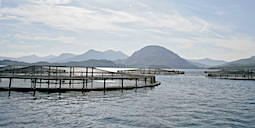Trade body Salmon Scotland has said Scotland’s fish farms have delivered a £3.3 billion boost to the country’s economy over the last decade.
Over the decade, farmers grew 1.9 million tonnes of fish worth £9 billion.
Salmon Scotland cited a Scottish Government report showing fish farmers’ economic contribution soared by 76% from £206 million in 2011 to £362 million in 2020.
Fish farming staff numbers also increased by nearly a third over the same period.
Salmon Scotland said the research shows that farm-raised salmon “generates vital wealth for the country”.
According to the Scottish Government findings, aquaculture was the third largest marine contributor in Gross Value Added (GVA), behind only oil and gas, and construction and water transport services.
Farming accounted for 9.4% of the Scottish marine economy in 2020.
Labour productivity (GVA per worker) for fish farming was second only to freight water transport in providing £151,565 per head.
The Scottish Government report comes amid calls for an overhaul of the cluttered regulatory and planning system for salmon farming.
“With streamlined reform, further sustainable growth for Scotland’s rural communities is achievable, creating more high-paid, high-skilled local jobs,” said Salmon Scotland.
“Salmon accounts for 96 per cent of Scotland’s aquaculture value, while recent HMRC data confirms that Scottish salmon is the UK’s largest food export.”
Salmon Scotland CEO Tavish Scott said: “Scottish salmon generates vital wealth for the country, and specifically for our islands and Highland coastal communities.
“Farm-raised Scottish salmon is a global success story that everyone in Scotland can take pride in, putting the best-tasting and healthiest protein product on people’s plates and delivering the highest environmental and welfare standards.
“I pay tribute to the farmers and all those involved in the journey from egg to plate.
“All this has been achieved despite the incredible challenges of Covid and Brexit, and with the right government support – streamlined regulation, a more business-friendly approach to immigration in the post-Brexit environment, and action to tackle rural housing shortages – we can deliver further sustainable growth.”
